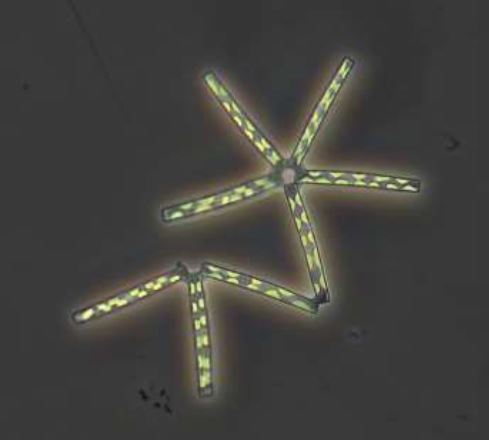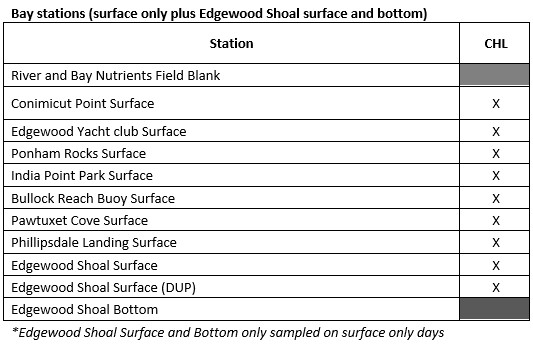Week of March 17 - 23, 2024
Phytoplankton Sampling
Phytoplankton samples were collected on March 20, 2024 at Bullock Reach and analyzed in the laboratory shortly after collection. It was partly sunny, breeze and brisk on Narragansett Bay. The qualitative tow net sample had a long filtration time, and the filtrate was a dark brown color. Some sediment and jellyfish were found in the sample.
The analysis of the quantitative whole water sample revealed a total of 3,536,000 cells per Liter. The micro flagellates were found at 20,000 cells/L. The most predominant phytoplankton genus was Thalassiosira spp. at 1,888,000 cells/L. Other representative genera include Skeletonema spp. and Leptocylindrus spp. Thalassiosira spp. (today's featured micrograph, 200x phase contrast) is a type of phytoplankton belonging to the centric diatom group. This photosynthetic species grows primarily in marine waters. Some species within the genus are found in estuaries and aquatic systems that have been impacted by human activities. They can be identified by their coin-like shape.
Week of March 3 - 9, 2024
Phytoplankton Sampling
Phytoplankton samples were collected on March 6, 2024 at Bullock Reach and analyzed in the laboratory shortly after collection. It was cloudy and mild on Narragansett Bay with an outgoing tide. The qualitative tow net sample had a moderate filter time, and the filtrate was a golden brown color.
The analysis of the quantitative whole water sample revealed a total of 24,820,000 cells per Liter. The micro flagellates were found at 40,000 cells/L. The most predominant phytoplankton genus was Leptocylindrus spp. at 3,840,000 cells/L. Other representative genera include Skeletonema spp. and Chaetoceros spp.
Thalassionema nitzschioides (today's featured micrograph, 200x phase contrast) is a type of phytoplankton belonging to the pennate diatom group. This photosynthetic species has small and numerous chloroplasts which give it a yellow brown color. The cells are usually found in star-shaped or in zigzagged chains. They occur in waters with salinity between 12-38 ppt and 15°C.

Week of March 03 - 09, 2024
R/V Monitor's Blog
Due to winter temperatures and weather conditions, boating activities were temporarily halted during the months of December 2023, January 2024, and February 2024. The safety of the crew as well as the boat are of the utmost concern at NBC. Whether it’s slipping on an icy dock or slipping on the boat decking, we don’t want injuries that can be avoided. Although staff wear appropriate gear during colder months, there is great risk to the life and health of crew if they were to slip and fall into the freezing waters during winter months. Staff have been evaluating conditions on a week-to-week basis and are pleased to announce that Nutrient Sampling was able to be conducted on March 6th. Staff are excited to resume boating activities and we are hopeful that favorable conditions continue throughout March. Below is a table showing the bay sites sampled.

Week of December 3 – 9, 2023
Fixed Site Network
On the morning of December 4th, the Phillipsdale Landing sondes were successfully removed for the 2023 season! For the one day of data available this week, water quality remained good, with similar conditions to last week.
The sondes at Bullock Reach were retrieved on November 14th for the 2023 season.
Week of November 26 – December 2, 2023
Fixed Site Network
Phillipsdale Landing
Overall, water quality was good at Phillipsdale Landing this week. There were 0.74 inches of precipitation recorded at T.F. Green this week, and Blackstone flows continued to be higher than normal for this time of year. Surface salinity averaged 8.0 ppt and ranged from 3.2 ppt to 20.4 ppt. Bottom salinity averaged 19.8 ppt and ranged from 6.2 ppt to 27.2 ppt. Temperatures continued to decline, averaging 6.4°C at the surface and ranging from 3.6°C to 8.8°C. At the bottom, temperatures averaged 8.5°C and ranged from 5.5°C to 10.1°C.
Dissolved oxygen (DO) at Phillipsdale Landing remained above the hypoxia threshold of 2.9 mg/L at both the surface and bottom all week. Surface DO was similar to last week, averaging 10.9 mg/L and ranging from 8.8 to 12.4 mg/L. Bottom DO averaged 8.7 mg/L and ranged from 7.3 mg/L to 11.0 mg/L. Chlorophyll readings remained mostly low with a few slightly elevated readings at the bottom. Chlorophyll averaged 0.6 ug/L at the surface and 1.9 ug/L at the bottom. Please note that tidal fluctuations and Blackstone River flows greatly influence water column salinity, temperature, and DO at this location.
Bullock Reach
The sondes at Bullock Reach have been retrieved for the 2023 season.



